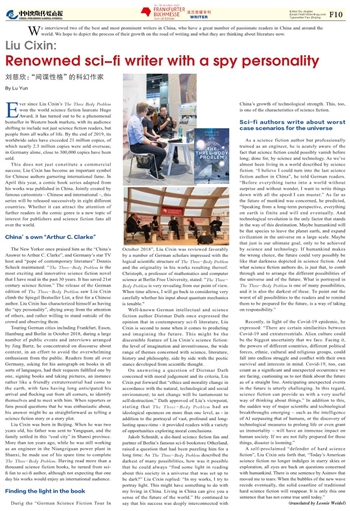By Lu Yun
We interviewed two of the best and most prominent writers in China, who have a great number of passionate readers in China and around the world. We hope to depict the process of their growth on the road of writing and what they are thinking about literature now.
Ever since Liu Cixin’s The Three Body Problem won the world science fiction laureate Hugo Award, it has turned out to be a phenomenal bestseller in Western book markets, with its audience shifting to include not just science fction readers, but people from all walks of life. By the end of 2019, its worldwide sales have exceeded 21 million copies, of which nearly 2.3 million copies were sold overseas; in Germany alone, close to 300,000 copies have been sold.
This does not just constitute a commercial success; Liu Cixin has become an important symbol for Chinese authors garnering international fame. In April this year, a comic book series adapted from his works was published in China. Jointly created by famous cartoonists – Chinese and international –, this series will be released successively in eight diferent countries. Whether it can attract the attention of further readers in the comic genre is a new topic of interest for publishers and science fiction fans all over the world.
China’s own “Arthur C. Clarke”
The New Yorker once praised him as the “China’s Answer to Arthur C. Clarke”, and Germany’s star TV host and “pope of contemporary literature” Dennis Scheck maintained: “The Three-Body Problem is the most exciting and innovative science fiction novel that I have read in the past 30 years. It has saved 21st century science fction.” The release of the German edition of The Three-Body Problem saw Liu Cixin climb the Spiegel Bestseller List, a frst for a Chinese author. Liu Cixin has characterized himself as having the “spy personality”, shying away from the attention of others, and rather willing to stand outside of the crowd and observing them.
Touring German cities including Frankfurt, Essen, Hamburg and Berlin in October 2018, during a large number of public events and interviews arranged by Jing Bartz, he concentrated on discourse about content, in an effort to avoid the overwhelming enthusiasm from the public. Readers from all over Germany, asking for his autograph on books in all sorts of languages, had their requests fulflled one by one, signing books and taking pictures, an instance rather like a friendly extraterrestrial had come to the earth, with fans having long anticipated his arrival and focking out from all corners, to identify themselves and to meet with him. When reporters or fans posed questions that he was enthusiastic about, his answer might be as straightforward as telling a science fction story or a story plot.
Liu Cixin was born in Beijing. When he was two years old, his father was sent to Yangquan, and the family settled in this “coal city” in Shanxi province. More than ten years ago, while he was still working as an engineer in the Niangziguan power plant in Shanxi, he made use of his spare time to complete The Three-Body Problem. Having read more than a thousand science fiction books, he turned from sci-f fan to sci-f author, although not expecting that one day his works would enjoy an international audience.
Finding the light in the book
Durig the “German Science Fiction Tour In October 2018”, Liu Cixin was reviewed favorably by a number of German scholars impressed with the logical scientifc structure of The Three-Body Problem and the originality in his works resulting thereof. Christoph, a professor of mathematics and computer science at Berlin Free University, stated: "The Three-Body Problem is very revealing from our point of view. When time allows, I will go back to considering very carefully whether his input about quantum mechanics is tenable."
Well-known German intellectual and science fiction author Dietmar Dath once expressed the opinion that in contemporary sci-fi literature, Liu Cixin is second to none when it comes to predicting and imagining the future. This might be the discernible feature of Liu Cixin’s science fiction: the level of imagination and inventiveness, the wide range of themes concerned with science, literature, history and philosophy, side by side with the poetic stance developed from scientifc thought.
On answering a question of Dietmar Dath concerned with moral judgement and its criteria, Liu Cixin put forward that “ethics and morality change in accordance with the natural, technological and social environment; to not change will be tantamount to self-destruction.” Dath approved of Liu’s viewpoint, stating that The Three-Body Problem had an ideological openness on more than one level, as - in addition to the portrayal of vast, profound and long-lasting space-time - it provided readers with a variety of opportunities exploring moral conclusions.
Jakob Schmidt, a die-hard science fction fan and partner of Berlin’s famous sci-f bookstore Otherland, raised a question that had been puzzling him for a long time: As The Three-Body Problem described the darkest of many possibilities, how was it possible that he could always “find some light in reading about this society in a universe that was set up to be dark?” Liu Cixin replied: “In my works, I try to portray light. This might have something to do with my living in China. Living in China can give you a sense of the future of the world.” He continued to say that his success was deeply interconnected with China’s growth of technological strength. This, too, is one of the characteristics of science fction.
Sci-fi authors write about worst case scenarios for the universe
As a science fiction author but professionally trained as an engineer, he is acutely aware of the fact that science fction could possibly vanish before long; done for, by science and technology. As we’ve almost been living in a world described by science fiction. “I believe I could turn into the last science fiction author in China”, he told German readers. “Before everything turns into a world without surprise and without wonder, I want to write things down with all the speed I can muster.” As far as the future of mankind was concerned, he predicted, “Speaking from a long-term perspective, everything on earth is finite and will end eventually. And technological revolution is the only factor that stands in the way of this destination. Maybe humankind will be that species to leave the planet earth, and expand civilization in the universe on a large scale. Maybe that just is our ultimate goal, only to be achieved by science and technology. If humankind makes the wrong choice, the future could very possibly be like that darkness depicted in science fiction. And what science fction authors do, is just that, to comb through and to arrange the different possibilities of the universe and of the future. What is portrayed in The Three-Body Problem is one of many possibilities, and it is also the darkest of these. To point out the worst of all possibilities to the readers and to remind them to be prepared for the future, is a way of taking on responsibility.”
Recently, in light of the Covid-19 epidemic, he expressed: “There are certain similarities between Covid-19 and extraterrestrials. Alien culture could be the biggest uncertainty that we face. Facing it, the powers of different countries, different political forces, ethnic, cultural and religious groups, could fall into endless struggle and confict with their own survival and interests in mind. Covid-19, too, can count as a signifcant and unexpected occurrence we are facing, cautioning us to not think about the future as of a straight line. Anticipating unexpected events in the future is utterly challenging. In this regard, science fiction can provide us with a very useful way of thinking about things.” In addition to this, the sudden way of major scientifc and technological breakthroughs emerging – such as the intelligence of AI surpassing that of humans, or the discovery of technological measures to prolong life or even grant us immortality – will have an immense impact on human society. If we are not fully prepared for these things, disaster is looming.”
A self-proclaimed “defender of hard science fction”, Liu Cixin sets forth that, “Today’s American science fiction no longer indulges in starry skies or exploration, all eyes are back on questions concerned with humankind. There is one sentence by Asimov that moved me to tears: When the bubbles of the new wave recede eventually, the solid coastline of traditional hard science fiction will reappear. It is only this one sentence that has not come true until today.”
(translated by Leonie Weidel)





